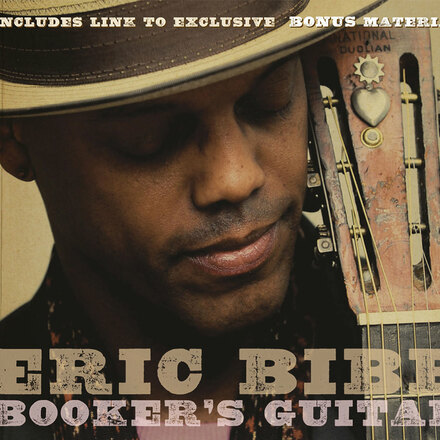Eric Bibb | Booker’s Guitar (Coming Jan. 26th, 2010)
The story is as legendary as Robert Johnson at the crossroads, as old as the blues itself. A traveling musician has a chance encounter in the most unlikely of places with something mystical and powerful, and everything changes. Suddenly, everything is up for grabs, and the music – already rich and historically resonant – takes a whole new direction.
So it was for itinerant troubadour Eric Bibb one night in a London hotel after a gig just a few years ago, when he was approached by a fan carrying a guitar case. Inside the case was a relic from the past that made the hair on the back of Bibb’s neck stand on end: a 1930s vintage Resophonic National steel-body guitar that had belonged to Delta blues legend Booker White. In a moment that could only be described as intoxicating, Bibb found himself holding Booker’s guitar, and catching a brief but revealing glimpse of all the stories locked within it.
Booker’s Guitar inspired a song, and the song became an entire album – one that captures the spirit of the original Delta blues of the early 20th century and reinterprets it for a new era. The title track, Bibb recorded in England using White’s guitar. The remaining tracks, although recorded in rural Ohio on Bibb’s own guitars, sprang from the same well of inspiration. “Once I had written that song, I really wanted to make a complete statement and document my connection to the Delta blues tradition,” says Bibb. “I really wanted to put myself in the position of my heroes, but in a contemporary context, and create songs that I feel could have been part of their repertoire and could have come from their own experience.”
That journey is one that crosses generations as much distances on any map. In the end, Booker’s Guitar – mystical and powerful – is the instrument that connects Eric Bibb to another era, and at the same time connects the blues of another era to the human experience of the modern day. “Writing a country blues song that draws on the traditions but is not rehashing old material from another era – writing something that’s both connected to that tradition but is contemporary as well – is hugely challenging,” says Bibb. “It’s tricky, but I was so happy that I was able to do it for a whole album, and really feel like I could stay focused on that whole sound and that whole culture. It was an achievement that I had been wanting to pull off, but hadn’t been able to do until now.”
Telarc/Heads Up International
